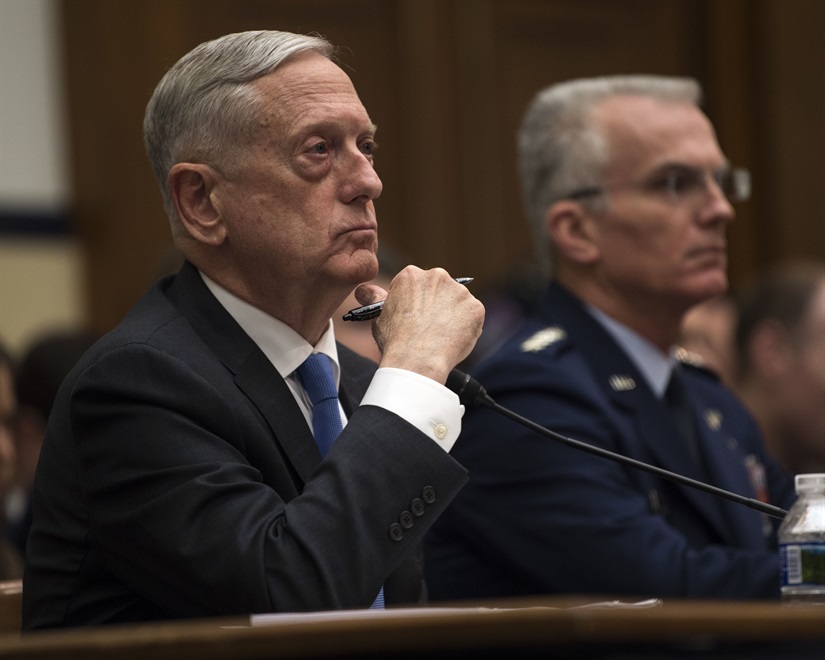
Defense Secretary Jim Mattis and Vice Chairman of the Joint Chiefs of Staff USAF Gen. Paul Selva appear before the House Armed Services Committee on Tuesday. Defense Department photo by Navy Petty Officer 1st Class Kathryn E. Holm.
Defense Secretary Jim Mattis warned lawmakers against yet another continuing resolution, claiming another long-term stopgap measure would take paychecks away from service members and limit the ability to recruit needed manpower.
The current funding for the government expires at 12 a.m. Friday, and House and Senate lawmakers continue to scramble for votes on a measure to keep the government open. However, Mattis told the House Armed Services Committee on Tuesday that yet another continuing resolution limits his ability to move the department forward.
“We are again on the verge of a government shutdown, or at best, another damaging continuing resolution,” said Mattis, who appeared before the panel to discuss the military’s National Defense Strategy and Nuclear Posture Review. “I regret that, without sustained, predictable appropriation, my presence here wastes your time, because no strategy can survive … without the funding necessary to resource it.”
For example, under a long-term continuing resolution, the military will not be able to pay for troops by the end of the fiscal year, and it will be unable to recruit 4,000 airmen and 15,000 soldiers needed to fill manning shortfalls. Aircraft will be grounded due to a lack of maintenance and spare parts, and ammunition stockpiles will be depleted.
“To advance the security of our nation, these troops are putting themselves in harm’s way, in effect, signing a blank check payable to the American people with their lives,” he said. “They do so despite Congress’s abrogation of its constitutional responsibility to provide sufficient, stable funding.”
The Nuclear Posture Review, released Friday, outlines modernization plans for the Pentagon to maintain a credible deterrent. This includes $700 million to modernize the triad to keep it viable 20 to 30 years in the future, Vice Chairman of the Joint Chiefs of Staff Gen. Paul Selva told the panel. The review assumes the Pentagon “will receive timely, predictable, and sufficient funding to execute,” he said.
The House of Representatives on Tuesday evening was preparing to vote for a bill that would provide $659 billion in funding for the military, essentially the full-year Fiscal 2018 amount, while providing a continuing resolution-level funding for the rest of the government until March 23. However, even if approved, the measure faces heavy opposition in the Senate, where Democrats are pushing for equal increases in defense and non-defense spending.
Despite this, Senate Majority Leader Mitch McConnell (R-Ky.) told reporters that he and Democratic leader Sen. Chuck Schumer (D-N.Y.) are “on the way to getting an agreement … very soon.”
President Trump, however, directly called for a shutdown during a White House meeting on immigration on Tuesday.
“I’d love to see a shutdown if we don’t get this stuff taken care of,” he said.